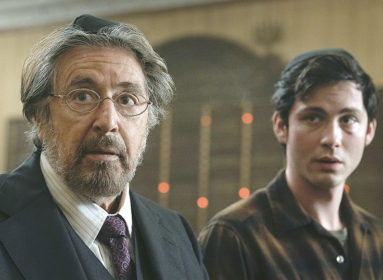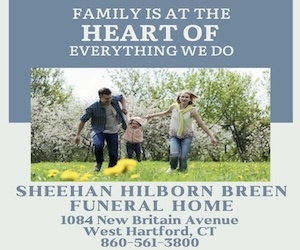WEST HARTFORD – In a time of synagogue attrition and mergers, it is remarkable (and heartening) to recognize a congregation for longevity. This year marks the significant anniversary of three Connecticut synagogues: Congregation Beth El in Fairfield (50), Congregation Beth El in Norwalk (80), and, one of the oldest, The Emanuel Synagogue in West Hartford, founded in 1919. The congregation will kick off its 95th birthday celebration on Sunday, April 6.
The Emanuel’s founding reflected the trend of many post-World War I American Jewish communities seeking a more modern interpretation of Jewish tradition and worship. In 1919, a group of young men met to discuss the formation of a new synagogue in Hartford, to reflect a more modern interpretation of Jewish tradition and worship. Informal services were held in an Orthodox synagogue on Winthrop Street, and then in Talmud Torah Hall on Pleasant Street. The congregation hired Rabbi Leon Spitz, ordained from the Jewish Theological Seminary of America, and on leave from the U.S. Army.
Congregants raised $30,000 to purchase the North Methodist Church on North Main Street, dedicated as a synagogue in 1920, and purchased a tract of land in Wethersfield to serve as a cemetery. That year, Rabbi Abraham Nowak was hired as the congregation’s first fulltime spiritual leader. In 1921, the General Assembly of the State of Connecticut passed House Bill 1050, incorporating the Emanuel Synagogue as an official religious congregation.

The Emanuel Synagogue on the corner of Woodland and Greenfield in Hartford was the first building the congregation built. It was first used for the High Holy Days in 1927.
By 1922, the Emanuel had 220 families, with 320 students in its Sunday school and 100 in its weekday Hebrew school. Morning and evening minyan services began in 1927, and have continued uninterrupted ever since. As the congregation grew, it purchased a functioning farm on Woodland Street between Albany Avenue and Greenfield Street, where it dedicated a new building in 1927.
By 1958, the religious school had become too small to meet the congregation’s growing number of children. Land was purchased at Emanuel’s current Mohegan Drive site, and the school and social hall were completed in time for High Holy Day services in 1959. Services continued at both the Hartford and West Hartford locations until 1967, and construction of the present sanctuary began in 1970, a classically modern, 600-seat space designed by renowned modern architect Bertrum Bassuk of New York City.
In 1983, the West Hartford Jewish community was attacked by an arsonist, who burned Young Israel on Albany Avenue and its rabbi’s home, the home of Emanuel members Dr. and Mrs. Leonard Kemler, and the Emanuel itself. The chapel was gutted, and Torah scrolls were charred beyond recognition, as were those in the main sanctuary, which also suffered severe smoke damage. High Holy Day services were held in the damaged sanctuary less than two weeks later. The newly arrived Rabbi Gerald Zelermyer wrote a special ceremony in which seven damaged Torah scrolls were buried beneath the Hebrew word “Emanuel” on the synagogue’s façade. Zelermyer, along with Philip Lazowski, are now rabbis emeriti.
Today, the congregation is led by Rabbi David J. Small and Cantor Sanford Cohn.
“We are large and also intimate, diverse and yet united in our commitments,” says Small. “We appeal to enthusiasts, to people who want to experience Jewish growth and meet other people who share their passion for Jewish life. We are very inclusive; there are few barriers to participation, and at the same time, we encourage our members to challenge themselves, to learn, to lead and to help build the community and make a difference in the world. Our people are friendly and care about the relationships they make. We find ways to be there for each other in all the aspects of life’s journey.”

The Emanuel building on Mohegan Drive in West Hartford in 1958. The school and auditorium were built first and the sanctuary added later.
The Emanuel sponsored a “Sanctuary Renaissance” project in 2012, which included improvements to wheelchair access, along with renovations to the chapel, lobby, and roof. “The sanctuary beautification is focused on our theme of respecting and restoring our historic past, yet making our sanctuary very much an inviting, 21st century sacred place for today and many years to come,” then-vice president Ira Henowitz told the Ledger as the project was completed. A local architect who worked on the sanctuary redesign committee pro bono, Henowitz is now president of what he calls the “95-year-young” Emanuel.
“Synagogues all across the country are facing challenges, yet we have welcomed 50 new member households in the past 12 months,” he says of the 750-family congregation. “I think it’s because we are a mission-focused, purpose-driven congregation; we center on being a community of participatory prayer, lifelong learning, love of Israel and the Jewish people, and being a vibrant community of caring and action.”
In addition, Henowitz says, tikkun olam – collectively helping to repair the world – is an integral part of the synagogue community’s mission. The Emanuel has long been involved with Foodshare, the Greater Hartford anti-hunger organization. “We believe that we have a real purpose to help our member family and the larger world,” he says. “There is value and meaning in our lives to come together, especially with the Internet, where you can connect virtually. As an individual, you can call Foodshare and volunteer, but we encourage our members to do so as a community.”
The kickoff celebration, on April 6, will honor two congregants who have spearheaded the synagogue’s tikkun olam efforts for decades, as well as Foodshare president and CEO, Gloria McAdam. Emanuel has forged a close relationship with Foodshare since 2002, when MAZON: A Jewish Response to Hunger requested that the synagogue present a check to the Connecticut anti-hunger organization. McAdam accepted the check on the bimah during Shabbat services.
“Gloria McAdam is one of the most effective leaders I have met,” says Small. “Foodshare does essential work in our community to alleviate hunger and with the aim of someday ending hunger in our communities.”
Fellow April 6 honoree Risa Davidson is a third-generation congregant, the granddaughter of original members David and Rose Mitnick. Her own involvement in the synagogue reflects that of her forebears: David served on the board of trustees and Davidson’s mother, Anne Mitnick Greenspon, was secretary to Rabbi Morris Silverman before World War II, later serving as Sisterhood vice president. As a congregant, Davidson has been chair of B’Yadeynu, the Emanuel’s social-action committee, for a decade, and co-chair, with fellow honoree Janet Wallans, for the last three years.
Under Davidson’s leadership, the committee has organized congregational responses to disasters around the globe. In 2007, B’Yadeynu created a petition to raise awareness about the crisis in Darfur and participated in the march on Washington sponsored by Save Darfur. The committee organizes annual Chanukah drives for members of the U.S. military serving overseas, as has the Kol Nidre Food Drive and the Lillian Harris Turkey Drive. The committee has also collected prayer books for Jewish prisoners in Connecticut, Christmas gifts for foster children, and clothing for families in need. Collaboration with other faith-based organizations resulted in three annual Harvest Festival fundraising events for Foodshare, and the annual Interfaith Seder at the State Capitol. Through collaboration with other Emanuel groups, B’Yadeynu has organized many special programs, including the Israel 60th Independence Day Celebration, an Israel Fair, and guest speakers from Israel and Darfur. In 2012, Davidson assisted in implementing Lotsa Helping Hands among the congregation, a social media tool used to post volunteer opportunities within the congregation and beyond.
“It means a great deal to me to be one of the honorees at this historic celebration,” Davidson says. “I view this honor as recognition of all the hard work of our entire committee, which has been committed to performing acts of tikkun olam within our community and beyond for over 20 years.”
Janet Wallans joined the Social Action Committee at its inception, when projects included preparing and serving Thanksgiving dinners at a homeless shelter and visiting seniors through Jewish Family Service of Greater Hartford. Wallans has organized clothing drives for a local shelter, Sudanese refugees, and survivors of civil war in Liberia. She has coordinated educational programs involving local and international guest speakers and has served as liaison to other groups in the Greater Hartford community such as the Save Darfur Coalition of CT and the Social Justice and Israel task forces of the Jewish Community Relations Council. She is currently working with organizations whose mission is to end the culture of violence in the local community.
“There are many causes I feel need help and I’m glad to have the opportunity to be involved in some of them,” says the second-generation congregant, who joined the synagogue in 1955. “I think it’s important for people to become involved in helping the larger community and, in our own congregation, there’s a lot of community spirit.”
That collective attitude is what the Emanuel prides itself on, says Ira Henowitz: a connection to the past with a focus on the future. Not only does the congregation boast several third-, fourth-, and even fifth-generation families, but the synagogue works to promote intergenerational programming and legacy-building.
Henowitz’s wife, Sally, is the granddaughter of original member Sam Goodman, who purchased a Torah scroll for the fledgling synagogue, which later burned in the 1970 chapel fire. To honor the memory of their ancestors, the Henowitzes and Sally’s siblings created the Goodman, Waxman, Henowitz Fund.
“I feel lucky that I was born into a family that has the common values of giving back, and being grounded and down to earth,” Sally says. “I hope that that’s what I pass down to my kids and what the Emanuel continues to reflect.”
As president, Ira Henowitz sees his job as leading the congregation into a future as vibrant as its past. “Decades ago, it was assumed that Jews would be members of a synagogue,” he says. “Today, we have to make a much more powerful case to join a sacred community. People are still and always looking for meaning and we have to create that place at the synagogue . We are working very hard to make sure that we are the compelling synagogue community that 21st-century Jews want to belong to and support.”
The Emanuel Synagogue 95th Anniversary Kick-off Event honoring congregants Risa Davidson and Janet Wallans, and Foodshare president and CEO Gloria McAdam is hosted by Rachel Frank, Fox CT meteorologist. It will also feature as keynote speaker Seth Waxman, 41st Solicitor General of the United States, who will discuss “ Tikkun Olam: What Emanuel Synagogue Taught Me.”
The event will be held on Sunday, April 6, 5:30 p.m., at The Emanuel Synagogue, 160 Mohegan Drive, West Hartford. For tickets and other information call (860) 236-1275 or email 95thcelebration@gmail.com.
Comment? cindym@jewishledger.com.








 Southern New England Jewish Ledger
Southern New England Jewish Ledger















